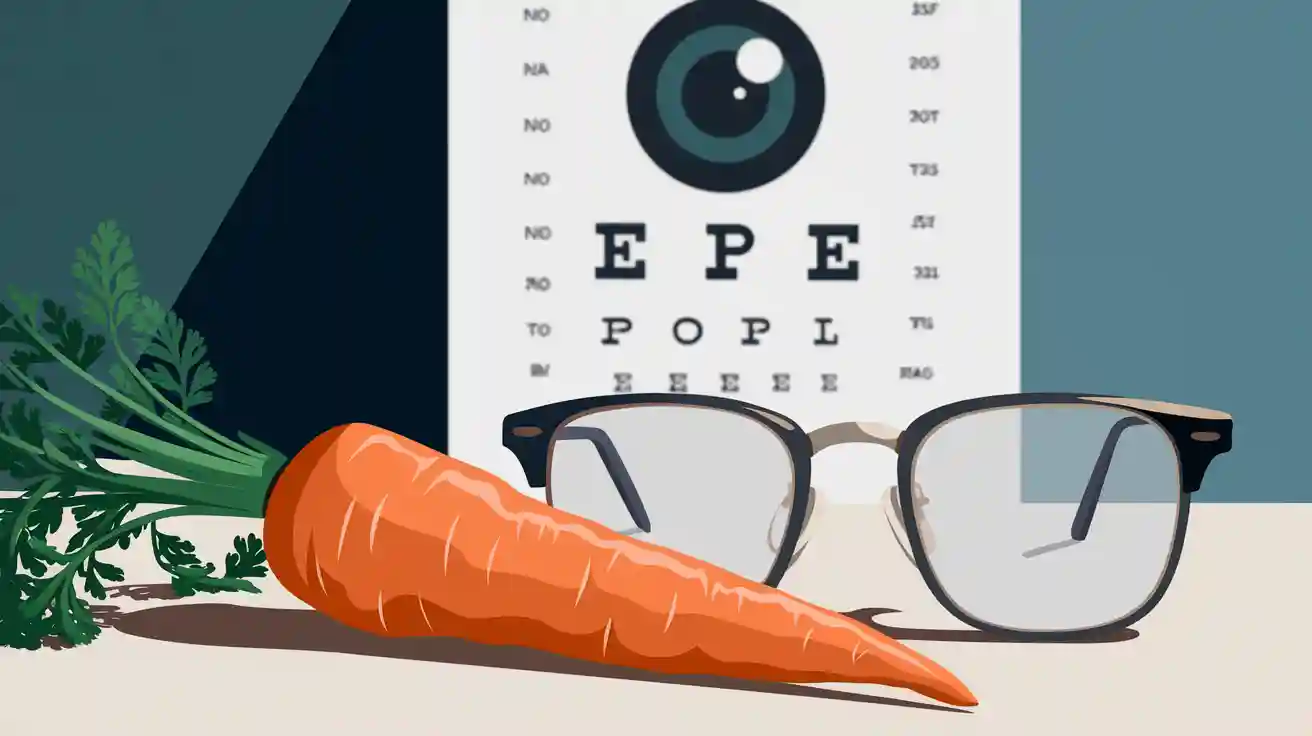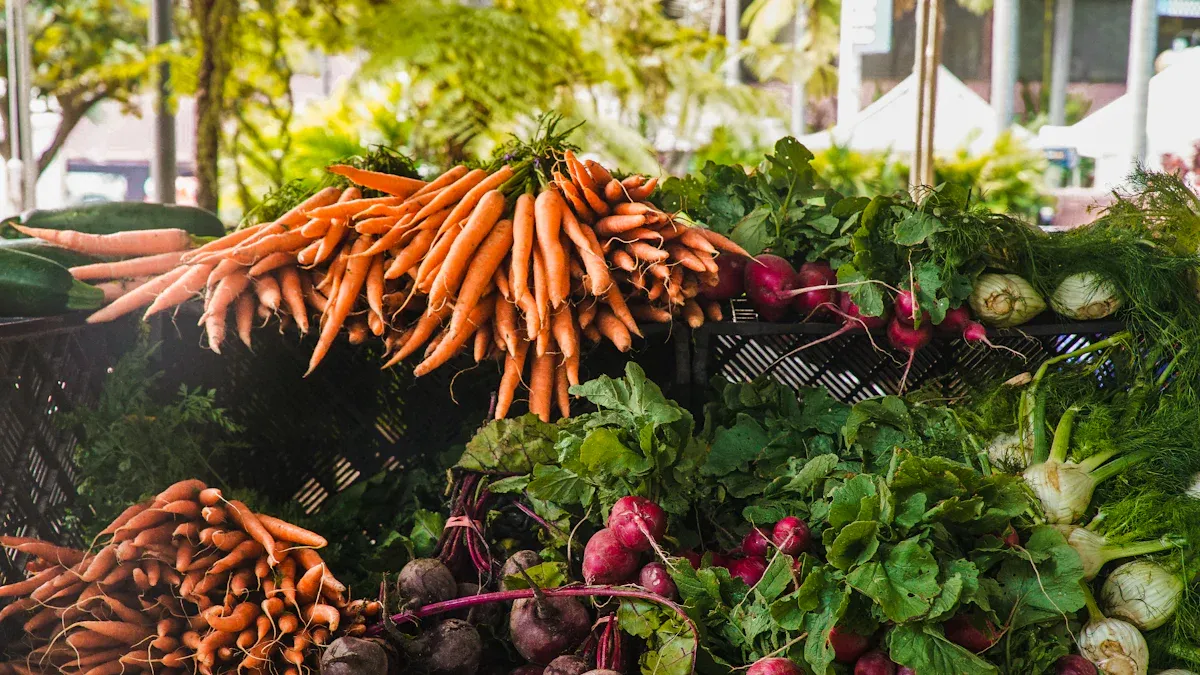
Carrots and eye health are closely linked, as these vibrant vegetables are essential for maintaining good vision. They are rich in vitamin A and carotenoids, which play a crucial role in supporting your eyesight. These nutrients also serve to protect your eyes from potential damage. Research indicates that a deficiency in vitamin A can lead to night blindness, but this condition can improve with the right vitamins. A medium carrot contains approximately 5.3 mg of β-carotene, which your body converts into vitamin A to benefit your eyes. Incorporating carrots into your diet provides your eyes with the necessary nutrients for optimal function.
While carrots are beneficial, they are not a cure-all for vision issues. It's important to maintain a balanced diet and schedule regular eye checkups as well.
Key Takeaways
Carrots have vitamin A and carotenoids that help your eyes stay healthy.
Eating carrots often can stop night blindness from low vitamin A, but they can't fix every eye problem.
Add foods like spinach, eggs, and sweet potatoes to your meals for better eye health.
Visit the eye doctor regularly to find problems early and keep your vision clear.
Sunglasses block harmful UV rays and lower the chance of cataracts or other eye issues.
Nutritional Benefits of Carrots and Eye Health
Vitamin A and Its Impact on Vision
Vitamin A is important for keeping your eyes healthy. When you eat carrots, your body turns beta-carotene into vitamin A. This helps your retina stay strong and healthy. Vitamin A also helps your eyes see better in dim light, lowering the chance of night blindness. Studies show eating carrots often can improve vision in low light. For instance, women who ate cooked carrots for six weeks saw better in the dark. But your body needs 12 to 21 beta-carotene molecules to make one vitamin A molecule. Once your body has enough vitamin A, it stops using extra beta-carotene. So, eating more carrots won’t endlessly improve your vision.
Carrots are good for your eyes, but they can’t fix all problems. Vision issues caused by aging or genetics can’t be solved by carrots. Still, adding carrots to your meals gives your eyes the vitamin A they need to work well.
Carotenoids and Their Antioxidant Role
Carrots are full of carotenoids like lutein and zeaxanthin. These are strong antioxidants that protect your eyes. They lower oxidative stress, which can cause eye problems like cataracts and AMD (age-related macular degeneration). Studies show eating more carotenoids can reduce the risk of AMD. This makes carrots a great food for keeping your eyes healthy as you age.
Lutein and zeaxanthin also protect your eyes from harmful blue light. Blue light can hurt your retina over time. Eating carrots often can help shield your eyes and lower the risk of serious eye diseases. Adding carotenoid-rich foods like carrots to your diet is a natural way to care for your eyes.
Other Nutrients in Carrots Supporting Eye Health
Carrots have more than just beta-carotene and carotenoids. They also contain vitamins C and E, which protect your eyes from damage caused by free radicals. These vitamins help prevent problems like cataracts and AMD. Carrots also have small amounts of zinc, which helps your retina stay healthy and process light better.
Eating carrots not only helps your vision but also supports overall eye health. Pairing carrots with foods like leafy greens or eggs can make them even more beneficial. This balanced diet gives your eyes all the nutrients they need to stay strong and healthy.
Debunking Myths About Carrots and Vision
The World War II Night Vision Propaganda
You may have heard carrots help you see in the dark. This idea became popular during World War II but isn’t fully true. The British government spread this myth as part of a clever plan. At that time, the Royal Air Force (RAF) used radar to find enemy planes at night. To keep radar secret, they claimed pilots had great night vision from eating carrots.
This story spread fast. People thought carrots improved eyesight during blackouts, which were common to protect cities from bombers. The government also urged people to grow and eat more carrots due to food rationing. While this campaign promoted healthy eating, it also created a lasting myth about carrots and night vision.
Even German pilots reportedly ate carrots, hoping to see better. But no science proves carrots alone improve night vision. The myth still exists today, but it’s important to know its historical background.
Scientific Truth About Night Blindness
Night blindness means trouble seeing in dim light. It often happens from not getting enough vitamin A. Your eyes need this vitamin to make rhodopsin, a pigment that helps you see in low light. Carrots, full of beta-carotene, can stop vitamin A deficiency. But eating more carrots won’t give you super sight.
If your diet already has enough vitamin A, extra carrots won’t help much. Night blindness from genetics or diseases can’t be fixed by eating carrots. Regular eye checkups can find the real cause and suggest proper treatment.
The Real Link Between Vitamin A and Vision
Vitamin A is key for keeping your eyes healthy. It helps your retina process light and send signals to your brain. Without enough vitamin A, your eyes may struggle to adjust to light changes, causing vision issues.
Carrots are a great source of beta-carotene, which turns into vitamin A in your body. Eating carrots can prevent vitamin A deficiency and support eye health. But carrots are just one part of the solution. A balanced diet with many nutrients is needed for good vision.
Carrots and eye health are connected, but they aren’t magic. Eating carrots often helps your eyes but won’t fix all vision problems. Knowing how vitamin A works can help you make smart choices for your diet and eye care.
Carrots vs. Other Eye-Healthy Foods

Sweet Potatoes and Their Vitamin A Content
Sweet potatoes are great for eye health. They have lots of beta-carotene, which turns into vitamin A in your body. Orange sweet potatoes often have more beta-carotene than carrots. The darker the orange, the more beta-carotene they contain. This makes sweet potatoes helpful for boosting vitamin A levels.
Eating sweet potatoes can protect your eyes from problems like AMD (age-related macular degeneration). Beta-carotene helps your retina stay healthy and supports good vision. If you want to mix up your meals, sweet potatoes are a tasty and healthy choice instead of carrots.
Leafy Greens and Their Vision Benefits
Leafy greens like spinach and kale are full of nutrients for your eyes. They have lutein and zeaxanthin, which are antioxidants that protect your eyes. These nutrients lower oxidative stress, which can cause cataracts and AMD. Studies show eating leafy greens can reduce the risk of glaucoma and other eye problems.
One study found older African American women who ate more greens had less glaucoma. Another study showed leafy greens and fruits lower the chance of cataracts. Adding greens to your meals can keep your eyes strong as you age.
Eggs and Other Sources of Vitamin A
Eggs are also good for your eyes. They have lutein and zeaxanthin, which protect your eyes from blue light and lower AMD risk. Eggs don’t have as much beta-carotene as carrots or sweet potatoes, but their vitamin A is easier for your body to use.
Research shows eggs, carrots, and other foods help keep your vision healthy. For example, studies on gerbils showed vitamin A from eggs and carrots supports eye health. Eating eggs with carrots and greens gives your eyes many important nutrients.
Practical Tips for Keeping Your Eyes Healthy
Why Eye Exams Matter
Getting regular eye checkups is very important for healthy eyes. These checkups can find problems early, like glaucoma or cataracts. Research shows about 93 million U.S. adults are at risk for vision loss. However, 40% of them didn’t get an eye exam last year. Catching issues early can stop small problems from becoming big ones.
Experts say more people need eye care as eye diseases increase. A yearly eye exam helps keep your vision clear and your eyes in good shape. If you wear glasses or contacts, these visits also make sure your prescription is correct.
Using Sunglasses to Protect Your Eyes
Wearing sunglasses is key to protecting your eyes from UV rays. UV rays can harm your eyes and cause cataracts or other problems. Sunglasses with UV protection block these harmful rays and keep your eyes safe.
Outdoor light is much stronger than indoor light, even with protection. Kids should play outside but wear sunglasses or hats to avoid UV damage. Making sun protection a habit helps keep your eyes safe over time.
Eating Well and Living Healthy
Eating foods with vitamins A, C, E, zinc, and omega-3s helps your eyes. Carrots, leafy greens, eggs, and sweet potatoes are great choices. Adding healthy fats like olive oil helps your body absorb these nutrients better.
Exercise also helps your eyes by improving blood flow. Quitting smoking lowers the chance of eye diseases since smoking damages eye tissues. Cutting screen time and using good lighting can stop digital eye strain. These easy changes, along with healthy eating, can keep your eyes strong and healthy.
Carrots are great for keeping your eyes healthy. They have vitamin A and carotenoids, which help your vision and shield your eyes from harm. But carrots alone can’t fix every eye problem. Eating a mix of healthy foods, like leafy greens and eggs, is important too. Don’t forget to get regular eye checkups and wear sunglasses to protect your eyes. By doing these things, you can keep your eyes strong and your vision clear for a long time.
FAQ
1. Can eating carrots make your eyesight better quickly?
No, carrots won’t improve your vision right away. They give vitamin A, which helps your eyes over time. If you already get enough vitamin A, eating more carrots won’t change much. It’s better to eat them regularly than expect fast results.
2. Are carrots the best food for your eyes?
Carrots are great for your eyes, but not the only choice. Foods like leafy greens, eggs, and sweet potatoes also have important nutrients. These include lutein, zeaxanthin, and omega-3s. Eating a mix of these foods is best for healthy vision.
3. How many carrots should you eat each day for your eyes?
You don’t need to eat carrots daily for eye health. One medium carrot has enough beta-carotene for your daily vitamin A needs. Combine carrots with other healthy foods for a balanced diet.
4. Do carrots stop age-related eye problems?
Carrots can lower the chance of eye problems like AMD and cataracts. Their antioxidants, like lutein and zeaxanthin, protect your eyes from damage. But carrots alone can’t stop these issues. Eye checkups and healthy habits are also important.
5. Do carrots help you see in the dark?
This is not true. Carrots can stop night blindness caused by low vitamin A. But they won’t give you super sight in the dark. This idea started as a World War II story, not real science.






